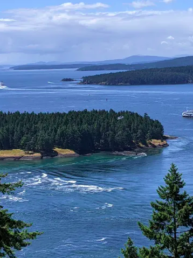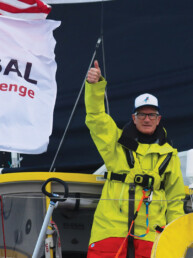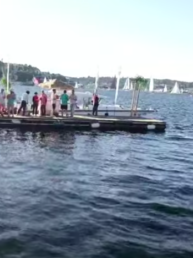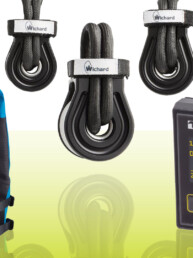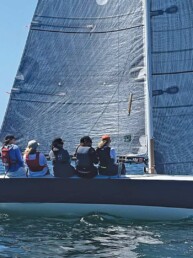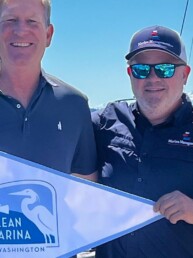In our latest Throwback Thursday, take a ride with two best friends as they navigate the Inside Passage on a San Juan 24.
From the May 2005 issue of 48° North
Leaning on the rail of the ferry as it rumbled away from the Tsawassen dock into the Strait of Georgia, I watched the sun rise and spill light across the mountains of the Coastal Range and the Cascades behind me and the peaks of Vancouver Island ahead. The only other vessel on the water during that transit was the one I imagined as I looked out over that deep water. She was a little sloop heading north, tiny in the vast expanse of water between Vancouver Island and the mainland, bow pointing vaguely toward Alaska.
I was heading to Nanaimo to view and perhaps buy a San Juan 24 that I hoped would look half as good live as she looked on the internet. My buddy Scott Dixon and I had talked about sailing the Inside Passage since we were eight years old. When I moved to the Coast for school and saw boats every day, coming and going from the San Juan Islands, I felt a certain ache in my chest.
The first symptoms of a growing obsession manifested as frequent walks on the docks where I looked at boats and daydreamed about getting on the water. I went into the chandleries and stared at charts and guidebooks. I struck up conversations with transient sailors who told amazing tales that added fuel to the fire. And somewhere along the line I realized that an old, small sloop could go for $5,000 bucks and the list of reasons why I shouldn’t try to buy one and sail to Alaska was short enough to put serious thought into the notion. Before I knew it I was in Canada, on a ferry, with a cashier’s check in my pocket that I would offer if this sailboat lived up to even half my expectations.
Twelve hours later I was back on the ferry, a bill of sale for a San Juan 24 called Merlin in my pocket. I was giddy and incredulous and well aware of my good luck. I would sail the Inside Passage on my own boat. I would do this in my early twenties instead of retirement, and I would make the trip with my best friend. While the sun dropped behind Vancouver Island, I phoned Scott from an onboard satellite payphone. He was halfway across the continent, living in Ohio. From a ferry off the coast of Canada, I told him to get ready for the trip of our lives.
* * *
A year and a half passed before we moved onto the boat. For a month, Scott and I stayed at the marina in Bellingham, finishing up the last of the preparations. Finally, we were loaded and ready to go, our new waterline now a couple inches higher than before.

Motoring out of Squalicum Harbor that mid-May afternoon, we didn’t realize that all the people we would meet in the months to come would be among the highlights of the Inside Passage. We set out imagining humpbacks and porpoises, fjords and waterfalls, crab and salmon. We looked forward to sailing twelve hours a day and dropping the hook in secluded coves. We wondered how the river-like narrows would treat us and we already looked forward to the occasional beer in far-flung coastal towns. We anticipated orcas and seals, ancient cedars and abandoned native villages. We expected bald eagles and bears and maybe even wolves in northern British Columbia. We could hardly wait to return to Desolation Sound, a place that had become mythical for us since our childhood trip there with our families. The trip met up to all of our expectations and more, but some of the most treasured memories are thanks to people we encountered as much as the sea and land we set out to experience.

Along the whole coast we were met with warmth, hospitality, and generosity. We stopped at Lagoon Cove, on East Cracroft Island near the mouth of Knight Inlet, for a quick fuel-up, maybe a ten minute stop, we thought. As we approached, though, we were motioned away from the fuel and shown clearly where to tie up. Rather than hollering our intentions, we followed orders. We were basically adopted by Bill and Jean, the owners, in about as much time as it took to secure the boat. Jean, a garrulous woman with a trace of a German accent, brought Scott and I a bowl heaped with jumbo prawns that Bill had caught and cooked just a few hours earlier. Before we had a chance to mutter a word, she instructed us to follow her for a tour. She introduced us to all the other boaters who were moored up there. And she told us to be at the house at 8 p.m. for desert with all the other boaters. It was a command we heartily welcomed, and all notions we had had of shoving off to anchor somewhere for free were dissolved. We had been traveling for weeks, motley but happy, and we stumbled into a little haven that received us like family.
When the evening of companionship, cake, and coffee was winding down, Scott and I made our move for the door. Jean followed and insisted that we spend the night in their floathouse, a luxurious cabin with big beds, hot water and showers. We had already lived aboard long enough that luxuries like running water and a shelter with enough room to stand were novel. After a great sleep, we walked back to our boat and heard Jean yell from her deck, “You boys come on up for some coffee!” We spent a good hour talking with her before we headed down to prepare for departure.
Crystale, a German woman we met in the house the night before, hailed us from her million-dollar motor yacht and invited us aboard. She and husband Arno had been up and down the coast a few times. We took a seat at the huge salon table and they shared stories about whales, icebergs, people, and foul currents in Petersburg. Crystale, with an accent much thicker than Jean’s, showed us maps and gave us tips on places to avoid, places we certainly shouldn’t miss, and places to remember as good emergency bail outs. She even handed me a pen and paper, and occasionally followed some of her lecture points with “Better write that down….””My own notes were additions to the several pages of notes she had pre-written for us that morning. We spent an hour with them, soaking up their earnest advice and thoroughly enjoying their company.
As we finally fueled up, Jean appeared with a care package stuffed with canned foods, leftover cake and cookies, and a quart of lemon juice—“You need this for your fish and for the brown water you might find in some of the ports further up the coast,” she said. Bill rounded out the offering by giving Scott, the fishermen for the trip, some local fishing tips.
* * *
We slowly plodded north, stubborn about sailing instead of motoring, even if it meant only making a couple knots. Even in narrow channels, we sailed into headwinds, happy to tack every fifteen minutes. When ferries or cruise ships passed us in the well-trafficked corridors, dozens of people waved and snapped photos or trained their video cameras on us. Our diminutive size definitely made us oddities, and sometimes those big ships made us feel like we were on the receiving end of a whale watching tour. It was strange to sometimes spend two or three days without really seeing anyone, and then to have a massive ship come around a corner lined with onlookers.

During a supply stop in Alert Bay, Scott’s sunglasses fell into the water and sank. The nearest store didn’t stock sunglasses. We were halfway to the one other possibility when an old man ran across the road and approached us, a little out of breath. “I heard you ask for sunglasses in the store…. I live right there. You can have these. I don’t wear ’em. Take this bottle of cleaner, too,” he said, handing Scott an old pair of aviator-style glasses and a bottle of anti-fog spray. What a guy! The name Barry was embroidered on his jacket, and after introducing ourselves, we had a great talk with the man about his life. Then he wished us well and said it was time to hit the bar, though it wasn’t even noon. Scott offered him five bucks for the glasses, which he declined, but when Scott said “Come on,“let me buy your first beer,” Barry relented and stuffed the bill in his pocket. For the rest of the trip Scott wore those glasses, which somehow acquired their former owner’s name. Weeks later, the sun breaking out of the clouds, it wasn’t uncommon for Scott to say “Where’d I put Barry…?”
We left Alert Bay, hoping to reach Beaver Harbor several miles up Queen Charlotte Strait. We had almost reached the exposed sound that served as a gateway into the northern, wilder stretch of coast. But when we rounded Pulteney Point, leaving the protection of Malcolm Island, we realized the small craft advisory in effect for the northern strait indicated a very rough southern strait, as well. Finding the lousy combination of massive waves and weak wind, we turned tail and retreated to Port McNeil on Vancouver Island. A lot of cruisers waited out the storm there—boat after boat came in, all of us weatherbound for two nights, though the conditions right in the bay weren’t bad. Tied up at the dock, Scott and I sat in the cockpit eating our specialty dinner, “Broccoli Festival,” when a young couple approached us. “Hey, nice to see another small boat out here,” the guy said. They belonged to the Alberg 30 tied up down the dock. They invited us over for some rum—“Better bring your own mugs, though,” the petite, blonde-haired woman said with a strong English accent.
We walked over and climbed aboard Steve and Sarah’s boat, thoroughly amazed at what we found. A surfboard was strapped to their deck, along with a massive wooden oar that served as a backup rudder. Inside, we could stand up straight. The bulkhead was decorated with blue tile, a heat barrier for the gas stove mounted there. One of the cabin lights was red, which created a nice ambiance, and a CD player that was actually powered by the boat battery played music. It was homey.
Steve and Sarah were from Ontario and London, respectively. Steve was just 27 and she was 25, not much older than us and they were living full time on a sailboat, traveling the world. Steve had made a huge amount of money on a fishing boat and had gotten a great deal on his Alberg, partly because there was a hole in the hull, which he had fixed better-than-new for $2,000. The two had met in Hawaii—Steve having sailed Kehloke there, Sarah having arrived there as a deckhand on a 48 footer that took her to the Galapagos and South America before reaching Hawaii. She jumped ship and joined Steve for the return sail to the west coast.
We talked for a couple hours in their beautiful, comfortable boat, listening to music and drinking gin and Gatorade, eventually deciding to find a pub. We should have predicted that at 12:30 pm on a Sunday night the bar would be “shut,” as Sarah put it. We “got on”amazingly and the four hours we had known these people could have been four years. The next night, still fenced in by a gale, we invited them over for barbecued shishkabobs, glad to return some of the generosity others had bestowed on us.
* * *
Eventually we crossed Queen Charlotte Sound and entered the remote north coast where boats as small as ours seemed nonexistent. For weeks we threaded our way through islands and channels. The north absorbed our little craft gracefully, and we were fortunate to cover hundreds of miles under sail. If there was the faintest breath of wind, we would raise the main before we hauled the anchor up, and we perfected our anchoring-under-sail technique. Our record was four days of travel without firing up the motor. Dinner often featured flounder, sole, rockfish, or crab, and at night we enjoyed the spray of stars across a sky totally free of light pollution.

Several days of perfect weather, and the unreliable VHF reception in some of the inlets, lulled us into a lazy carelessness. Over half way through Grenville Channel, we awoke to rain and wind, but neglected to try for a weather report. Out in the main channel we found a stiff southerly, which made for some pretty nice sailing. It was my shift, and we flew along at seven knots over the ground thanks to the favorable current and following seas. Eventually the waves and wind were too strong to safely stay on a run, so I came up to a broad reach and jibed back and forth down the very narrow corridor. The wind increased and I single-reefed the main and furled most of the genoa.
By the time we left Grenville Channel it was very windy and visibility was limited. Turning back was not an option in the heavy southerly and increasingly large waves, and the last point of shelter we had passed was several miles back, anyway. A strong puff snapped the aft reefing line block clean off the boom and the sail tie-downs came loose. In the chaos, I hollered for help and Scott came bounding out of the cabin, instantly soaked in the rain and spray, and he wrangled the sail back onto the boom and then headed back down to get his foul weather gear on. I should have asked him to come up sooner, and from down below he couldn’t realize how quickly things were escalating. In no time at all we found ourselves in six foot waves, their tops shorn off and blown into pure spray by the wind. A weather report later confirmed our estimate of 50 knot winds.
After taking the helm for a spell, Scott went below to get the chart for the waters ahead so we could find shelter. We knew of a place called Lawson Bay, the last possible bail out before entering the wide open Chatham Sound, which would eat us alive in those conditions.
And then we remembered standing in Steveston Marine in Vancouver near a pile of charts we would definitely buy, debating whether it was worth another $20 to eliminate the mile-wide gap between one of our old, used charts, and the adjacent new chart of Chatham Sound that was on the top of the pile. We planned on cruising straight through that stretch of water without stopping and we were already on a shoestring budget that made another $20 seem like a fortune. That chart clearly showed that the main channel was free of obstacles, so we agreed that we could do without the chart. Besides, George Vancouver sailed the whole coast without charts or guidebooks.
Murphy probably laughed as we experienced his Law, looking to enter a narrow bay that the cruising guide warned was riddled with rocks, in horrid conditions with no chart, in the only mile of coast that we didn’t have a chart for between Bellingham and Alaska.
We sailed hard for an hour or so and entered the critical territory. Scott brought Merlin into the bay, firing up the outboard, both of us straining into the water for signs of rocks or shallows, and we made it safely. A low spit separated us from the six-foot waves, but the full brunt of the wind was still upon us. We set both of our oversized anchors, the boat getting blasted by the constant wind, but we were out of the waves. If the cleats held, we’d be fine.
We had not seen one boat all day. A full-fledged storm was tearing the area apart. It was wet and cold. We assumed we were miles away from the nearest people. A single crab pot buoy was the only sign anyone else had ever been in the bay. I hungrily joked about pulling it up and claiming dinner. As soon as I uttered the thought, a skiff roared around a point in the bay and beelined for the buoy. Glad I hadn’t acted on my little daydream, I went about securing Merlin for the night.
The guy manning the skiff had to make two approaches before he succeeded in coming alongside Merlin in the heavy wind. He grabbed the toe rail and yelled “Take“a couple crabs!””Scott and I each grabbed a live one from the half-dozen clicking and clacking on the bottom of his boat while he held on to our boat, and we dumbly thanked him, surprised again by this most unexpected showing of generosity.
* * *

That was the last bad storm, though not the last of our troubles. Yet kindness like that of the crabber continued throughout our trip. Two commercial fishermen we met on the Ketchikan docks gave us four massive fillets of salmon and four beers. We received fresh baked cookies, muffins, dinner, advice, beer, and company from all sorts of people. During an unfortunate period of time when our busted outboard stranded us in Prince Rupert, a man named Don Burton gave us rides, meals, and encouragement, even offering to host my girlfriend and I at his homestead in interior B.C. when we drove to Alaska several months later. Others gave us crab bait, fishing lures, even a spare gas can and water jug. We were a pair of young, scraggly, dirty kids on a laughably small boat who looked like we could use a hand. People were more than willing to lend a hand, they went out of their way to do so. Life afloat brings out the best in people. As that summer eventually ended I realized I had a renewed faith in humanity that matched the love of place that had tempted me from the beginning into northern latitudes.
48°N


